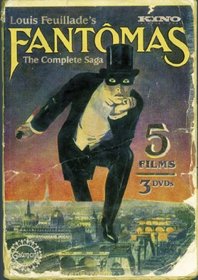| Actors: Rene Navarre, Edmund Breon, Georges Melchior, Rene Carl Director: Louis Feuillade Genres: Indie & Art House, Classics, Mystery & Suspense Sub-Genres: Indie & Art House, Silent Films, Mystery & Suspense Studio: KINO INTERNATIONAL Format: DVD - Black and White DVD Release Date: 09/21/2010 Release Year: 2010 Run Time: 5hr 11min Screens: Black and White Number of Discs: 3 SwapaDVD Credits: 3 Total Copies: 0 Members Wishing: 4 Edition: Box set MPAA Rating: NR (Not Rated) |
Search - Fantomas: Five Film Collection on DVD
  | Fantomas Five Film Collection Actors: Rene Navarre, Edmund Breon, Georges Melchior, Rene Carl Director: Louis Feuillade Genres: Indie & Art House, Classics, Mystery & Suspense NR 2010 5hr 11min |
Larger Image |
Movie Details
We're sorry, our database doesn't have DVD description information for this item. Click here to check Amazon's database -- you can return to this page by closing the new browser tab/window if you want to obtain the DVD from SwapaDVD.
Click here to submit a DVD description for approval.
Similar Movies
|
Movie Reviews"Enfantômastic!" M. Boxwood | 09/26/2010 (5 out of 5 stars) "Just like its eponymous antagonist towering over Paris at dusk, Fantômas looms over the thriller genre, presaging the work of Fritz Lang, Alfred Hitchcock, and countless others. A series of five films produced in France during 1913-14 by Louis Feuillade, "Fantômas" reflected the era's fascination with outlandish criminal masterminds and nudged the thriller genre into realms of surrealism and poetic sadism. The films are linked together by virtue of the characters, but each can be enjoyed on its own terms. Part One, "In the Shadow of the Guillotine," introduces the basic dynamic between arch-fiend Fantômas and the duo obsessively devoted to bringing him to justice, Juve of the Sûreté and his loyal sidekick, the reporter Fandor. Fantômas quickly demonstrates his defining characteristics, an uncanny ability to assume new identities and an utter ruthlessness. His exploitation of the character of Lady Beltham borders on the vampiric. The second film, "Juve vs. Fantômas" is a fever dream of pulpish delights including a train wreck, a gun battle culminating in an inferno, and a killer boa constrictor. It concludes with Fantômas blowing up the house with the two protagonists still inside and their fates unknown. Much of Part Three, "The Murderous Corpse," plays like a fin-de-siècle police procedural as the authorities step up their investigative efforts, and the subsequent film, "Fantômas vs. Fantômas," ratchets up the surrealism with a bleeding wall and a costumed ball attended by three guests dressed as Fantômas. The final film, "The False Magistrate," offers the viewer the best opportunity to observe the villain's methods as he assumes the identity of a judicial official and abuses the position for his own nefarious gains. Modern viewers may find devoting five-and-a-half hours to watch a silent French serial to be unreasonable: the camera remains largely motionless and scenes play themselves out with only a modicum of edits. Those approaching Fantômas with patience and an open mind will be amply rewarded. Images become like a tableau and linger in the mind. Like Feuillade's other thrillers, "Les Vampires" and "Judex," "Fantômas" takes on the texture of a filmed dream, almost like an "Inception" made a century earlier. Identities are exchanged and abandoned with ease while motives and intentions remain unclear. The films generally look exceptionally good for their age although portions of "The False Magistrate" are lost and replaced with descriptions and a still photograph. While visually pleasing, the musical score, drawn from a French music library, presents some minor issues. Many of the cues selected compliment the action on screen, but in other instances the music overplays the menace or the comedy. Also certain vocal pieces and occasional sound effects (gunshots, applause, etc.) are distracting and reminiscent of budget-priced DVD releases. The exemplary work done by composer Robert Israel on "Les Vampires" and "Judex" is greatly missed here. This is a minor quibble given the overall excellence of the restoration and the supplementary features included by Kino. In addition to a still gallery is an audio commentary by film scholar David Kalat on the first two films. Kalat provided one of the most informative and entertaining commentaries I've ever listened to for Image's release of "Dr. Mabuse, der Spieler" and he brings the same insight and enthusiasm to this project. Fuelliade's directorial versatility is demonstrated by a ten-minute film on his career and a pair of short films, "The Nativity" (1910) and "The Dwarf" (1912). Overall it's a fantastic set that belongs in the collection of anyone with an interest in early cinema, pulp thrillers, or great storytelling. " FANTOMAS: THE MOVIES' FIRST CRIMINAL MASTERMIND Anthony Crnkovich | Chicago, Illinois | 10/29/2010 (5 out of 5 stars) "French film pioneer Louis Feuillade's 1913 groundbreaking, epic crime thriller FANTOMAS is a captivating viewing experience. This five part series was based on the popular French pulp novels of the day and served as the prototype for all future films in this vein, including Feuillade's own brilliant follow up LES VAMPIRES and Fritz Lang's terrific DR. MABUSE saga.
The intrigue is all very intricately presented with the title master criminal assuming several different identities along the way in order to throw the authorities off his track. FANTOMAS has a neatly mixed atmosphere of fantasy and realism, with its outrageous premise being played out in and around the streets of Paris before the outbreak of World War 1. This is partly what makes these films so fascinating to watch today. Presented with an effective music score by Catalougue Sonimage and an informative commentary by historian David Kalat, Kino's beautiful restoration preserves FANTOMAS so that modern viewers can better appreciate Feuillade's innovative masterpiece." |


